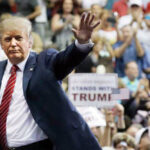WHEN Barack Obama became President in 2009, one of the most important decisions in his first 100 days was probably the passage of the American Recovery and Reinvestment Act (ARRA) to address the Great Recession. After much debate, the $787 billion ARRA bill-combining tax breaks with spending on infrastructure projects, extension of welfare benefits, and education, originally intended to be bipartisan-was passed by both the House and Senate on February 13, 2009. It was hailed as the first step to ‘We can do it-make America great again’.
Eight years later the Republican president Donald Trump is taking series of actions in his first 100 days to do the same thing-make America great again. In his inaugural address, Trump said the US for too long has been invested in other countries’ industries, militaries, borders and infrastructure while letting its own fall into “disrepair and decay.” “That is the past,” he said.
During the run up to the fiercely contested presidential contest, many in India weighed this question, who is good for India, Trump or Hillary? Long columns in op-ed pages of national dailies extensively quoted foreign journals which said ‘stop this man’. One of the strong arguments was that Trump does not have the backing of his party. But Trump rose above his party. The next argument was even more sanguine-if only there was someone else other than Trump the contest would have been worth watching rather than being a cakewalk for Hillary. Closer to the polls, some of the US experts donned the weatherman’s cap and promptly took their position on the fence.
Notwithstanding the American role in geo-political affairs, all US presidents in the first hundred days have to address the issues at home such as unemployment, job loss, housing and tax relief-same as in India, roti-kapada-makan. True to his campaign style, Trump made the loss of five million jobs in the last decade-and-a-half an election issue. He openly advocated renegotiating NAFTA (‘Free Trade Agreements are not working for USA’) and scared the voters with $20 trillion national debt.
Trump’s ingenious campaign rolled all issues, homeland security, job loss, make-in-America and terrorism into one, immigration. Needless to say, his first major policy decision was on the issue of immigration. The issue of immigration in America is in no way new or unheard of. From less than 50,000 in 1930s to over a crore immigrants getting permanent residency in the US in 2015, the American dream continues to attract people.
From Colonial era to the last century, decade after decade witnessed different people and nationalities not only migrating to the land of opportunities, but also enriching the land of their adoption.
Obama, who supported a comprehensive immigration reform, saved about seven lakh illegal immigrants from deportation. Trump made an issue out of this and promptly invited criticism of polarising the society. But his voters were convinced and voted him to power. In all likelihood, Trump’s ban order on seven Islamic countries will have a long-term consequence, but in the short-term it will help him stabilise the internal security parameters and also keep his flock happy.
In his inaugural address, Trump made it clear that his policy will support the idea of ‘buy American, hire American’. This is an extension of what he said at all his campaign speeches. The cutting down of H1B visa, especially to highly skilled Indian technology personal who account for 70 per cent of visas, will seriously affect Indian companies in the immediate future.
There are many contradictions in his policy implementation. While he has named Iran as one of the countries whose visa applications will be put on hold, he also expects Iran to be on the side of those who fight ISIS. Now both Iran and Russia are on the same page as far as fighting ISIS is concerned, but it is doubtful if they will work shoulder-to-shoulder with the US. This could result in a setback to the US-led war against “Radical Islamic Terrorism,” which Trump vowed to eradicate from the face of earth.
THE seven countries that face Trump’s visa ban may also gang up against US and consider serious action against America. This could include broad economic actions that may have little impact to high velocity terror attacks and lone wolf attacks on American assets and persons.
Another serious policy change of Trump administration will be on US approach towards China. Trump has already disturbed the longstanding US-China equation by calling up Taiwan president even before speaking to China. This has not only upset Beijing, but also prompted it to engage thousands of think tanks all over the world to consider possible responses. China is secretly happy with Trump’s decision of pulling out of TPP, which was mainly aimed at isolating China. Trump’s reportedly covert support to his campaign ‘from Russia with love’ has rolled out many US-Russia bhai bhai theories. From geopolitical issues to energy security, number of issues could come for the two countries to work together.
These are some of the issues that will have longer lasting effect on India-US engagement. Though Trump has put seven Islamic countries on ‘no visa’ list, Pakistan is not yet in that list. But enough warning has been issued, forcing Islamabad to put Hafiz Syed under house arrest, albeit, friendly house arrest with total guarantee of unlimited supply of biryani and all other perks that top ISI terrorists are entitled to. Given Trump’s way of working, it is a matter of days, not months, before Pakistan is put under surveillance.
India cannot wait for the US to take appropriate action against Pakistan. New Delhi may have to initiate policy changes and step in to alleviate the sufferings of the people of Baluchistan and Sind. Some of the leaders from these areas are expecting assistance, ranging from moral support to recognition of their government in exile. India should do all necessary home work and convince Trump administration on the strategic need to gain free access to Gwadar region.
US-RUSSIA friendly equation could actually work in our favour if we are able to play a balancing role. It is nobody’s argument that we should appear to be totally on the side of US in its China policy, but, at the same time, we should also not forget that China has established its CPEC through Indian Territory illegally occupied by Pakistan. Again, with US pulling out of TPP, India should fine tune the working of BIMSTEC, Look East-Act East policy and other bilateral and multilateral arrangements to tap the Asian markets and regain strategic space in the Indo-Pacific region.
True to his election promise-“H-1B, whatever it is, I use it but I don’t like it. I want to scrap all H-1B visas”-Trump has introduced a bill to that effect. This will no doubt affect our export-led growth. India’s IT services accounted for about $82 billion of exports up to March 2015. If this bill imposes a 15 per cent hike, the cost of services could go up and dent the profit margin if service cost is not hiked in order to be competitive.

During the run up to elections in 2008, Obama had named Bangalore and promised to stop outsourcing of American jobs outside of US. He had suggested a revamp of federal tax code. As president he came out with a plan to revamp tax rules and end the tax deferral system, which was likely to impose 35 per cent tax on US corporations with major Indian operations. However, Obama’s tax changes did not happen. Now it is Trump’s turn.
Trump’s advisors should know that critical areas of US security is vulnerable to cyber attack and it is the Indian-supported IT industry that is sincerely working to protect US interests. Besides, some of the IT service providers may even branch out and relocate their business to economically viable country, meaning India. This way we stand to derive additional benefit. It is obvious that such a situation may not come as gratis, but New Delhi will have put its house in order before inviting these IT giants to come and set up shop here.
New Delhi, under the leadership of Narendra Modi, will surely work its way to US policymakers and secure India’s security, economic and strategic interests. But all the same, it is essential to know which door to knock for the right answer and optimum result in the next four years of Trump regime.
In an objective examination there was a question: Who runs America?
The President, you said? Wrong. That is not even an option. The options were: a) CIA/FBI b) Americans c) None of the two.
When reports last came in, the world was still looking for an answer.
The author is Secretary General of Forum for Integrated National Security (FINS).Email: charidr.fins@gmail.com












































